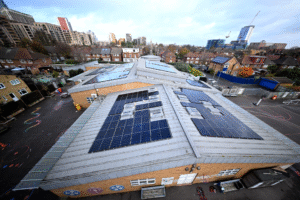The biome-based biodiversity destination has partnered with Volvo to prove the impact of low and zero emission plant vehicles.
Over the course of three months, Volvo Construction Equipment (Volvo CE) deployed both the emission-free ECR25 Electric compact excavator and the L25 Electric compact wheel loader. Both machines were used for a variety of applications at the site, which is one of Britain’s leading tourist attractions, including a brand new nursery currently in development, including landscaping, repairs, maintenance and material handling.
Overall, these two construction vehicles alone saved three tonnes of CO2 from being released into the atmosphere compared with traditional diesel-powered equivalents. Looking at energy consumption specifically, around 2,000 kWh of electricity was saved in the process.
Both the Eden Project and the Scandinavian engineering giant believe this makes a viable case for decarbonising construction processes. The Eden Project, which is located in Cornwall, has already committed to become a climate positive organisation by 2030. Meanwhile, Volvo has the goal of reaching net zero by 2040, with validation from the Science Based Targets Initiative.
‘Collaborating with other like-minded organizations like the Eden Project is an essential part of accelerating the transition to electric equipment,’ said Mats Bredborg, Head of Customer Cluster Utility at Volvo Construction.
‘We have zero-emission solutions that are reducing our industry’s carbon footprint across sectors – and we need partners on this journey to put these solutions into action,’ he continued. ‘With its commitment to working with nature in diverse ways, including reducing energy use, making soil from recycled waste, buying locally, driving electric vehicles and supporting responsible global trade, Eden is a natural choice for landscaping.’
Take a look at the video below to see the work in action.
















